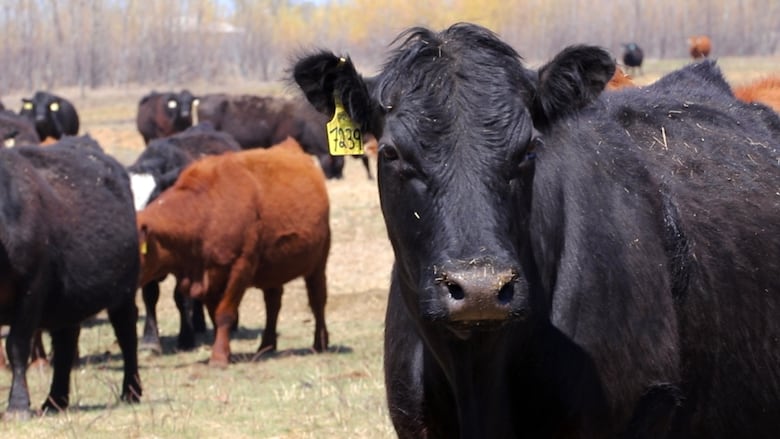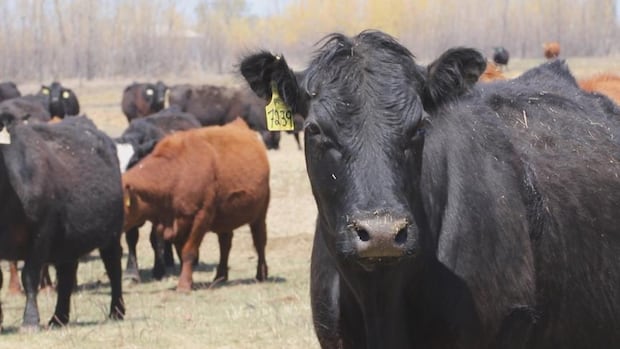Smoky conditions and hot weather impacting Manitoba's agricultural producers
Health effects caused by poor air quality can hurt producers' bottom line, Winnipeg vet says

In a growing season that's already experienced more than 30 days of air quality warnings, Manitoba's farmers are adjusting to keep themselves and their animals safe amid smoky conditions from wildfires burning across the province.
In Pipestone, Man., the orange haze can get so thick it's hard to see more than half a mile, says cattle producer Melissa Atchison. That means during the tail end of calving season, they're taking extra precautions to keep themselves and their animals healthy.
"It's not as if you are going to have pre-smoked meat," Atchison said. "It doesn't affect meat quality.… It's more about managing their health and their lungs and their respiratory system."
Jonas Watson, a veterinarian at Winnipeg's Grant Park Animal Hospital, said the adverse health effects caused by poor air quality can also hurt producers' bottom line.
The summer's intense heat can impact an outdoor animal's breathing at the best of times — but add in irritants like smoke and their health can be greatly compromised, he said.
"That can irritate the respiratory system, potentially predisposing [them] to upper and lower respiratory infections, including pneumonias," Watson said, adding that could mean "irreversible damage done to lungs and airways of cattle and other species."
"Hopefully we will not be seeing conditions … where animals like cattle and horses outdoors are adversely affected in the long term."
While the best option is to bring animals inside and out of the smoke, that's not feasible for large herds of livestock, he said. That means producers need to be checking in on animals, especially if they have respiratory conditions or are predisposed to illnesses like pneumonia.
The Canadian Cattle Association says acute signs of smoke exposure include animals coughing, gagging or having difficulty breathing, as well as experiencing eye irritation and watering or nasal discharge.
They say that makes it essential to keep an eye on cattle and ensure they have access to clean water and feed.
Smoke and health
While the intense smoke Manitoba has experienced this year has helped regulate crop temperatures during hot days, it's also made working conditions tough for farmers, said Jill Verwey, president of Keystone Agricultural Producers.
That means they need to make sure they're taking breaks and watching the forecast for when air quality will be especially bad, Verwey said.
"The heat and humidity being outside probably has a big impact on a producer's health," she said. "Anyone that's out in the elements, certainly if you're high-risk, you want to stay out of the areas outside if the smoke is that dense."
Despite the smoke, farmers' main concern remains the moderate to severe drought stretching across the province, Verwey said.
For now, cattle producer Atchison said she's constantly checking the air quality on phone. Her goal is to avoid any strenuous activities for animals, like vaccinations or moving pastures, on the extra smoky days.
"We need to consider everybody's health on these pretty rotten days," Atchison said. "As long as we are doing our best to manage around these really smoky days, I think we're in a really good spot."


